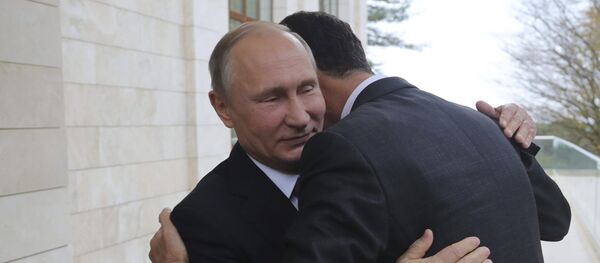Although the conflict is officially classified as a civil war, it has drawn in combatants and military assets from a range of world powers. Military personnel from Russia, Iran and Hezbollah intervened at the request of the Syrian government, assisting the Syrian Army in its nationwide battle against various terrorist groups.
Meanwhile, the US-led coalition, and a limited number of Turkish troops, are operating on Syrian soil and airspace without Damascus' approval, to achieve their own foreign policy objectives. In fact, senior officials from the Syrian government have persistently expressed opposition to the presence of non-authorized forces in Syria, describing their activity as a breach of Syrian sovereignty.
In the latest wave of this rhetoric, Bouthaina Shaaban, a top adviser to President Bashar al-Assad, dubbed US and Turkish troops as "illegal invaders."
"Turkey today is a colonizer country, its forces on our soil are illegal, just as the American forces are on our soil illegally. We will deal with this issue as we deal with any illegal invader force on our lands," Bouthaina Shaaban told Al-Mayadeen News earlier this month.
Around a week after Ms. Shaaban's comments, US Defense Secretary Jim Mattis insisted that the US would remain in Syria until the Geneva process yielded some sort of political settlement.
"We're not just going to walk away right now before the Geneva process has cracked. That doesn't mean everyone stays there. That doesn't mean for certain — certain troops are leaving. I'm just saying that we're going to condition — and I've honestly not made those decisions. We're going to make sure we set the conditions for a diplomatic solution… Not just, you know, fight the cop part of it and then say good luck on the rest of it. We did it for that — to support the diplomatic solution," US Defense Secretary Jim Mattis said.
The announcement was somewhat surprising, as the US claims to have intervened in Syria to defeat Daesh terrorists, not to influence negotiations in Geneva.
However, with the Syrian Army and the wider alliance of pro-government forces preparing to launch an offensive in northern Syria, against non-Daesh Islamist militants, Turkey may soon be forced to withdraw, or risk direct confrontation with Syrian and Russian forces.
The presence of troops from the Iranian Revolutionary Guard Corps (IRGC) in Syria, particularly in southern Syria, has alarmed Israel, as it fears Iran will use Syria as a springboard to launch attacks against the Zionist state.
Recently, there appeared to be some confusion over reports that Russia and the US had agreed to reduce Iran's military activity in the war-torn state, with Russian Foreign Minister Sergey Lavrov later describing Iranian troops in Syria as "legitimate."
Although the Syrian government is likely to disband some domestic militias once the conflict reaches its conclusion, or incorporate them into the Syrian Army, its stance towards Iranian, and other non-Syrian forces, is less clear.
In any case, based on its record, we can be confident that the Syrian government will formulate and execute its policy on this matter with the best interests of Syria, and its citizens, in mind.
The views expressed in this article are solely those of the author and do not necessarily reflect the official position of Sputnik.
Follow Suliman Mulhem on Twitter.


